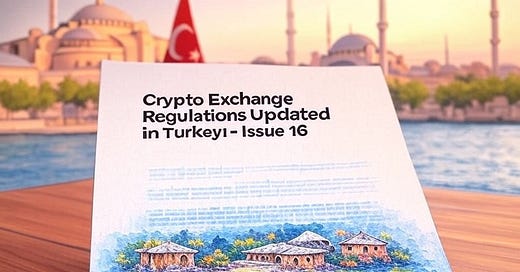Understanding Web3 Legal: Crypto Exchange Regulations Updated in Turkey! - Issue 16
On March 13, 2025, four new communiqués were published in the Official Gazette, introducing long-awaited secondary regulations for crypto asset service providers (commonly known as crypto exchanges)
On March 13, 2025, four new communiqués were published in the Official Gazette, introducing long-awaited secondary regulations for crypto asset service providers (commonly known as crypto exchanges) in Turkey. These regulations bring significant changes for companies operating in the sector. Here are the key highlights:
Capital Adequacy Requirements
The minimum capital requirement for crypto exchanges is set at 150,000,000 TRY (~$4.8 million), while custody service providers must have at least 500,000,000 TRY (~$16 million) in capital. Compared to MiCA’s €150,000 (~$162,000) capital requirement, this is significantly higher. However, there is ongoing debate about whether this amount is sufficient given the size of Turkey’s crypto user base.
Relationship Between Custody Providers and Exchanges
At least 95% of customer assets must be held by custody providers, while only 5% can be kept by exchanges. These ratios must be monitored dynamically throughout the day and must never exceed a 90%-10% split. Additionally, exchanges must maintain liquid reserves equal to 3% of the customer assets they hold. While most of the burden falls on custody providers, this liquidity requirement suggests that past financial crises have not been fully accounted for.
New Management Requirements
General managers and deputy general managers of crypto exchanges must have at least seven years of professional experience in financial markets, IT, information technologies, or financial technologies. Even if they meet these criteria, SPK (Capital Markets Board of Turkey) approval is required for their appointment.
Transparency Requirement: KAP Compliance
Crypto exchanges are now subject to Kamuyu Aydınlatma Platformu (KAP) disclosure requirements. One particularly noteworthy regulation (Article 24-i) mandates exchanges to disclose their listing procedures via KAP, bringing much-needed transparency to crypto asset listing processes.
SPK Approval for Share Transfers
Shareholder changes in crypto exchanges are now subject to SPK approval. Transfers of 10%, 20%, 33%, or 50% ownership stakes require regulatory approval, while even minor ownership changes must be reported to the SPK. Additionally, the Competition Authority will oversee mergers and acquisitions, making such transactions more complex.
Restrictions on Marketing and Promotions
Exchanges cannot conduct marketing campaigns promising additional income.
Insurance policies cannot be used as a marketing tool.
High-reward promotional campaigns are prohibited.
Mandatory Independent Audits
Crypto asset service providers must undergo annual independent audits covering internal controls and information systems. These audits must be conducted by authorized institutions.
Regulatory Deadlines
Exchanges must apply for operational licenses by the end of June.
They must integrate with custody providers by the end of the year.
Exchange contracts must be renewed by the end of the year.
Trading Restrictions That Could Push Traders to Global Platforms
Crypto exchanges operating in Turkey are now prohibited from offering leveraged trading, derivative contracts, margin trading, short selling, or lending services. While these measures aim to protect consumers, they could drive major investors to global exchanges.
Removal of Previous Guidelines
With the publication of these communiqués, previous SPK principle decisions on the same subject have been repealed. This marks a regulatory turning point, providing more clarity while also initiating a major transition period for the industry.
Conclusion
A new era is beginning for Turkey’s crypto ecosystem. These regulations are designed to create a safer and more structured market, but they may also lead to some exchanges exiting the market and institutional traders moving to global platforms. In the coming months, we will closely monitor how these rules are implemented and their impact on the industry.
For those looking for content in Turkish, I have shared a detailed breakdown on Twitter. You can find it here.
If you have any questions or need further clarifications, feel free to reach out! For centralized exchanges (CEXs), the communiqué contains numerous detailed calculations that might require additional explanation.
See you in the next edition!
— Mümtaz




